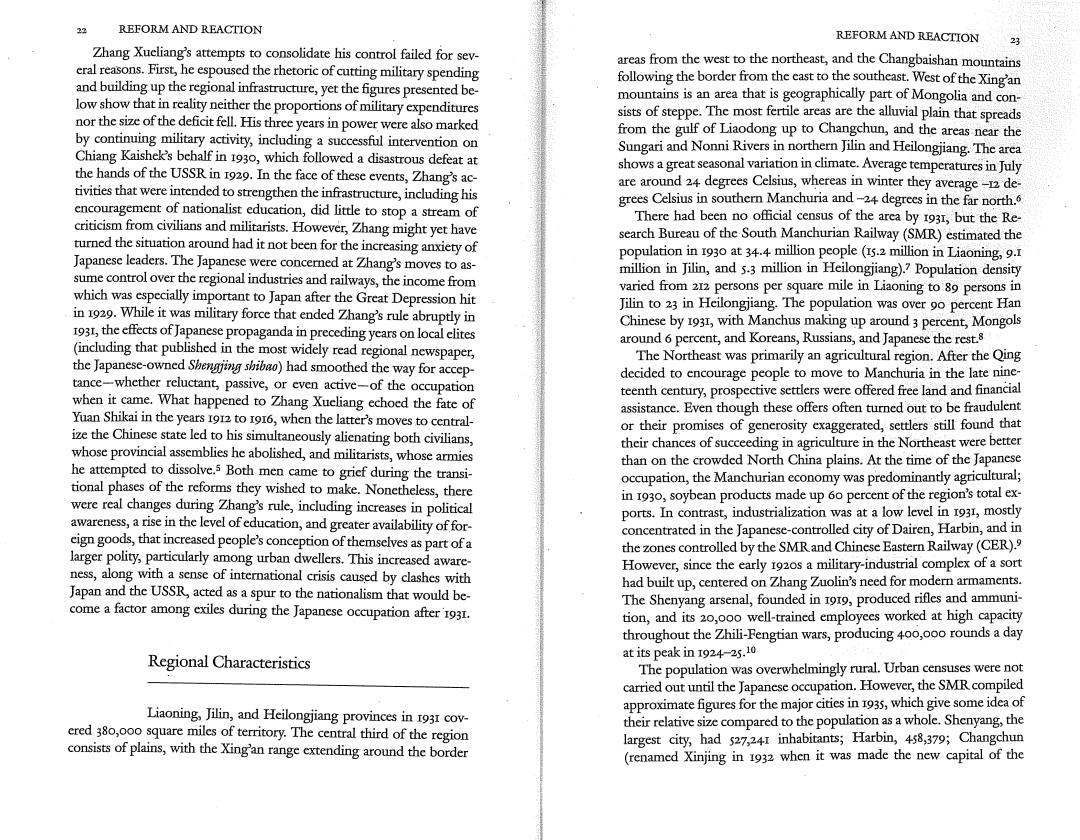
22 REFORM AND REACTION REFORM AND REACTION 2 Zhang Xucliang's attempts to consolidate his control failed for sev- eral reasons.First,he espoused the rhetoric of cutting military spending areas from the west to the northeast,and the Changbaishan mountains and building up the regional infrastructure,yet the figures presented be- following the border from the cast to the southeast.West of the Xingan low show that in reality neither the proportions of military expenditures mountains is an area that is geographically part of Mongolia and con- nor the size of the deficit fell.His three years in power were also marked sists of steppe.The most fertile areas are the alluvial plain that spreads by continuing military activity,including a successful intervention on from the gulf of Liaodong up to Changchun,and the areas near the Chiang Kaishek's behalf in 1930,which followed a disastrous defeat at Sungari and Nonni Rivers in northern Jilin and Heilongjiang.The arca the hands of the USSR in 1929.In the face of these events,Zhang's ac- shows a great seasonal variation in climate.Average temperatures in July tivities that were intended to strengthen the infrastructure,including his are around4 degrees Celsius,whereas in winter they averagede- encouragement of nationalist education,did little to stop a stream of grees Celsius in southern Manchuria and-24 degrees in the far north.s criticism from civilians and militarists.However,Zhang might yet have There had been no official census of the area by 1931,but the Re- turned the situation around had it not been for the increasing anxiety of search Bureau of the South Manchurian Railway(SMR)estimated the Japanese leaders.The Japanese were concerned at Zhang's moves to as- population in 1930 at 34.4 million people (1s.2 million in Liaoning,9.I sume control over the regional industries and railways,the income from million in Jilin,and 5.3 million in Heilongjiang).7Population density which was especially important to Japan after the Great Depression hit varied from 2r2 persons per square mile in Liaoning to 89 persons in in 1929.While it was military force that ended Zhang's rule abruptly in Jilin to 23 in Heilongjiang.The population was over 9o percent Han 1931,the effects of Japanese propaganda in preceding years on local elites Chinese by I931,with Manchus making up around 3 percent,Mongols (including that published in the most widely read regional newspaper, around 6 percent,and Koreans,Russians,and Japanese the rest.8 the Japanese-owned heng)had smoothed the way for accep- The Northeast was primarily an agricultural region.After the Qing tance-whether reluctant,passive,or even active-of the occupation decided to encourage people to move to Manchuria in the late nine- when it came.What happened to Zhang Xucliang echoed the fate of teenth century,prospective settlers were offered free land and financial Yuan Shikai in the years IoI2 to r96,when the latter's moves to central- assistance.Even though these offers often turned out to be fraudulent ize the Chinese state led to his simultaneously alienating both civilians, or their promises of generosity exaggerated,settlers still found that whose provincial assemblies he abolished,and militarists,whose armies their chances of succeeding in agriculture in the Northeast were better than on the crowded North China plains.At the time of the Japanese he attempted to dissolve.5 Both men came to grief during the transi- tional phases of the reforms they wished to make.Nonetheless,there occupation,the Manchurian economy was predominantly agricultural; were real changes during Zhang's rule,including increases in political in 1930,soybean products made up 6o percent of the region's total ex- awareness,a rise in the level of education,and greater availability of for- ports.In contrast,industrialization was at a low level in 1931,mostly eign goods,that increased people's conception of themselves as part of a concentrated in the Japanese-controlled city of Dairen,Harbin,and in the zones controlled by the SMRand Chinese Eastern Railway(CER). larger polity,particularly among urban dwellers.This increased aware- ness,along with a sense of international crisis caused by clashes with However,since the early I92os a military-industrial complex of a sort Japan and the USSR,acted as a spur to the nationalism that would be- had built up,centered on Zhang Zuolin's need for modern armaments. come a factor among exiles during the Japanese occupation after 1931. The Shenyang arsenal,founded in I9r9,produced rifles and ammuni- tion,and its 20,ooo well-trained employees worked at high capacity throughout the Zhili-Fengtian wars,producing 400,oo0 rounds a day Regional Characteristics at its peak in 1924-25.10 The population was overwhelmingly rural.Urban censuses were not carried out until the Japanese occupation.However,the SMR compiled Liaoning,Jilin,and Heilongjiang provinces in 193I cov- approximate figures for the major cities in 1935,which give some idea of ered 380,oo0 square miles of territory.The central third of the region their relative size compared to the population as a whole.Shenyang,the consists of plains,with the Xing'an range extending around the border largest city,had s27,24r inhabitants;Harbin,458,379;Changchun (renamed Xinjing in 1932 when it was made the new capital of the
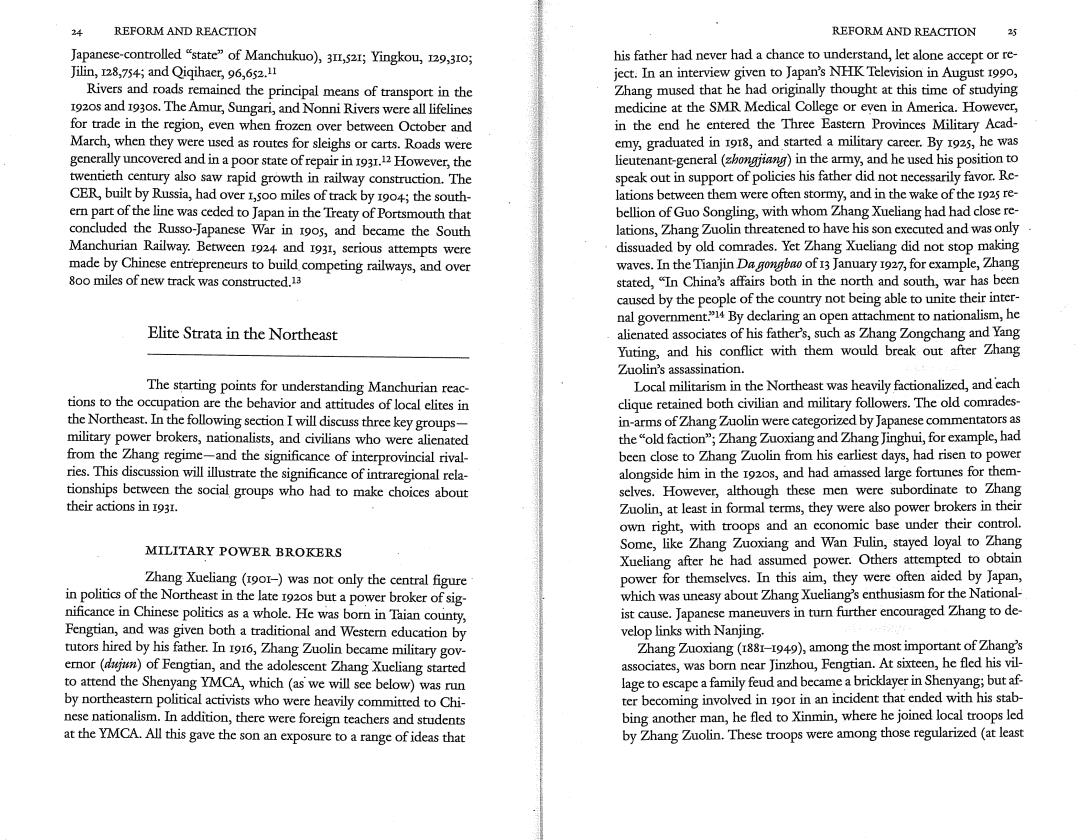
24 REFORM AND REACTION REFORM AND REACTION 25 Japanese-controlled"state"of Manchukuo),3,;Yingkou,; his father had never had a chance to understand,let alone accept or re- Jilin,128,754;and Qiqihaer,96,652.11 ject.In an interview given to Japan's NHK Television in August 1990, Rivers and roads remained the principal means of transport in the Zhang mused that he had originally thought at this time of studying 192os and 1930s.The Amur,Sungari,and Nonni Rivers were all lifelines medicine at the SMR Medical College or even in America.However, for trade in the region,even when frozen over between October and in the end he entered the Three Eastern Provinces Military Acad- March,when they were used as routes for sleighs or carts.Roads were emy,graduated in I9,and started a military carcer.By 1925,he was generally uncovered and in a poor state of repair in 1931.12 However,the lieutenant-general(zhongjing)in the army,and he used his position to twentieth century also saw rapid growth in railway construction.The speak out in support of policies his father did not necessarily favor.Re- CER,built by Russia,had over I,soo miles of track by 1904;the south- lations between them were often stormy,and in the wake of the 192s re- ern part of the line was ceded to Japan in the Treaty of Portsmouth that bellion of Guo Songling,with whom Zhang Xueliang had had close re- concluded the Russo-Japanese War in r9os,and became the South lations,Zhang Zuolin threatened to have his son executed and was only Manchurian Railway.Between 1924 and 1931,scrious attempts were dissuaded by old comrades.Yet Zhang Xueliang did not stop making made by Chinese entrepreneurs to build competing railways,and over waves.In the Tianjin Da gongbao of 13 January 1927,for example,Zhang 8oo miles of new track was constructed.13 stated,"In China's affairs both in the north and south,war has been caused by the people of the country not being able to unite their inter- nal government 14 By declaring an open attachment to nationalism,he Elite Strata in the Northeast alienated associates of his father's,such as Zhang Zongchang and Yang Yuting,and his conflict with them would break out after Zhang Zuolin's assassination. The starting points for understanding Manchurian reac- Local militarism in the Northeast was heavily factionalized,and each tions to the occupation are the behavior and attitudes of local elites in clique retained both civilian and military followers.The old comrades- the Northeast.In the following section I will discuss three key groups- in-arms of Zhang Zuolin were categorized by Japanese commentators as military power brokers,nationalists,and civilians who were alienated the"old faction";Zhang Zuoxiang and Zhang Jinghui,for example,had from the Zhang regime-and the significance of interprovincial rival- been close to Zhang Zuolin from his earliest days,had risen to power ries.This discussion will illustrate the significance of intraregional rela- alongside him in the Igzos,and had amassed large fortunes for them- tionships between the social groups who had to make choices about selves.However,although these men were subordinate to Zhang their actions in 1931. Zuolin,at least in formal terms,they were also power brokers in their own right,with troops and an economic base under their control. MILITARY POWER BROKERS Some,like Zhang Zuoxiang and Wan Fulin,stayed loyal to Zhang Xueliang after he had assumed power.Others attempted to obtain Zhang Xueliang (r9or-)was not only the central figure power for themselves.In this aim,they were often aided by Japan, in politics of the Northeast in the late I92os but a power broker of sig- which was uneasy about Zhang Xueliang's enthusiasm for the National- nificance in Chinese politics as a whole.He was born in Taian county, ist cause.Japanese maneuvers in turn further encouraged Zhang to de- Fengtian,and was given both a traditional and Western education by velop links with Nanjing. tutors hired by his father.In 1916,Zhang Zuolin became military gov- Zhang Zuoxiang(1881-1949),among the most important of Zhang's ernor(djin)of Fengtian,and the adolescent Zhang Xucliang started associates,was born near Jinzhou,Fengtian.At sixteen,he fled his vil- to attend the Shenyang YMCA,which (as we will see below)was run lage to escape a family feud and became a bricklayer in Shenyang;but af- by northeastern political activists who were heavily committed to Chi- ter becoming involved in roor in an incident that ended with his stab- nese nationalism.In addition,there were foreign teachers and students bing another man,he fled to Xinmin,where he joined local troops led at the YMCA.All this gave the son an exposure to a range of ideas that by Zhang Zuolin.These troops were among those regularized (at least
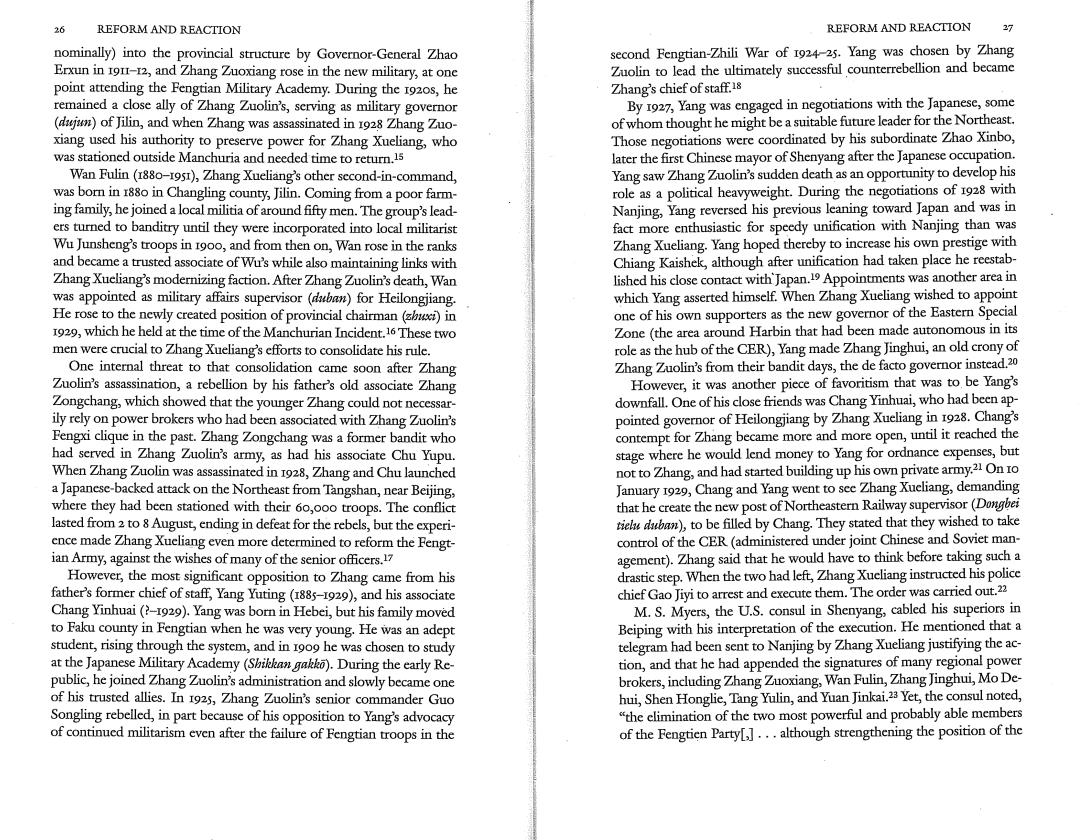
26 REFORM AND REACTION REFORM AND REACTION nominally)into the provincial structure by Governor-General Zhao second Fengtian-Zhili War of 1924-25.Yang was chosen by Zhang Erxun in rou-12,and Zhang Zuoxiang rose in the new military,at one Zuolin to lead the ultimately successful counterrebellion and became point attending the Fengtian Military Academy.During the r92os,he Zhang's chief of staff.18 remained a close ally of Zhang Zuolin's,serving as military governor By 1927,Yang was engaged in negotiations with the Japanese,some (dij)of Jilin,and when Zhang was assassinated in 1928 Zhang Zuo- of whom thought he might be a suitable future leader for the Northeast. xiang used his authority to preserve power for Zhang Xueliang,who Those negotiations were coordinated by his subordinate Zhao Xinbo, was stationed outside Manchuria and needed time to return.15 later the first Chinese mayor of Shenyang after the Japanese occupation. Wan Fulin(1880-r9sr),Zhang Xueliang's other second-in-command, Yang saw Zhang Zuolin's sudden death as an opportunity to develop his was born in 1880 in Changling county,Jilin.Coming from a poor farm- role as a political heavyweight.During the negotiations of 1928 with ing family,he joined a local militia of around fifty men.The group's lead- Nanjing,Yang reversed his previous leaning toward Japan and was in ers turned to banditry until they were incorporated into local militarist fact more enthusiastic for speedy unification with Nanjing than was Wu Junsheng's troops in rgoo,and from then on,Wan rose in the ranks Zhang Xueliang.Yang hoped thereby to increase his own prestige with and became a trusted associate of Wu's while also maintaining links with Chiang Kaishek,although after unification had taken place he reestab- Zhang Xucliang's modernizing faction.After Zhang Zuolin's death,Wan lished his close contact with Japan.19 Appointments was another area in was appointed as military affairs supervisor (for Heilongjiang. which Yang asserted himself.When Zhang Xueliang wished to appoint He rose to the newly created position of provincial chairman()in one of his own supporters as the new governor of the Eastern Special 1929,which he held at the time of the Manchurian Incident.16 These two Zone (the area around Harbin that had been made autonomous in its men were crucial to Zhang Xueliang's efforts to consolidate his rule. role as the hub of the CER),Yang made Zhang Jinghui,an old crony of One internal threat to that consolidation came soon after Zhang Zhang Zuolin's from their bandit days,the de facto governor instead.20 Zuolin's assassination,a rebellion by his father's old associate Zhang However,it was another piece of favoritism that was to be Yang's Zongchang,which showed that the younger Zhang could not necessar- downfall.One of his close friends was Chang Yinhuai,who had been ap- ily rely on power brokers who had been associated with Zhang Zuolin's pointed governor of Heilongjiang by Zhang Xueliang in 1928.Chang's Fengxi clique in the past.Zhang Zongchang was a former bandit who contempt for Zhang became more and more open,until it reached the had served in Zhang Zuolin's army,as had his associate Chu Yupu. stage where he would lend money to Yang for ordnance expenses,but When Zhang Zuolin was assassinated in 1928,Zhang and Chu launched not to Zhang,and had started building up his own private army.21 On ro a Japancse-backed attack on the Northeast from Tangshan,near Beijing, January 1929,Chang and Yang went to see Zhang Xueliang,demanding where they had been stationed with their 60,ooo troops.The conflict that he create the new post of Northeastern Railway supervisor(Dongbei lasted from 2 to 8 August,ending in defeat for the rebels,but the experi- tiel),to be filled by Chang.They stated that they wished to take ence made Zhang Xueliang even more determined to reform the Fengt- control of the CER (administered under joint Chinese and Soviet man- ian Army,against the wishes of many of the senior officers.17 agement).Zhang said that he would have to think before taking such a However,the most significant opposition to Zhang came from his drastic step.When the two had left,Zhang Xucliang instructed his police father's former chief of staff,Yang Yuting (1885-1929),and his associate chief Gao Jiyi to arrest and execute them.The order was carried out.22 Chang Yinhuai (2-1929).Yang was born in Hebei,but his family moved M.S.Myers,the U.S.consul in Shenyang,cabled his superiors in to Faku county in Fengtian when he was very young.He was an adept Beiping with his interpretation of the execution.He mentioned that a student,rising through the system,and in Igog he was chosen to study telegram had been sent to Nanjing by Zhang Xueliang justifying the ac- at the Japanese Military Academy (Shikkan gakko).During the early Re- tion,and that he had appended the signatures of many regional power public,he joined Zhang Zuolin's administration and slowly became one brokers,including Zhang Zuoxiang,Wan Fulin,Zhang Jinghui,Mo De- of his trusted allies.In 1925,Zhang Zuolin's senior commander Guo hui,Shen Honglie,Tang Yulin,and Yuan Jinkai.23 Yet,the consul noted, Songling rebelled,in part because of his opposition to Yang's advocacy "the climination of the two most powerful and probably able members of continued militarism even after the failure of Fengtian troops in the of the Fengtien Party[,]...although strengthening the position of the
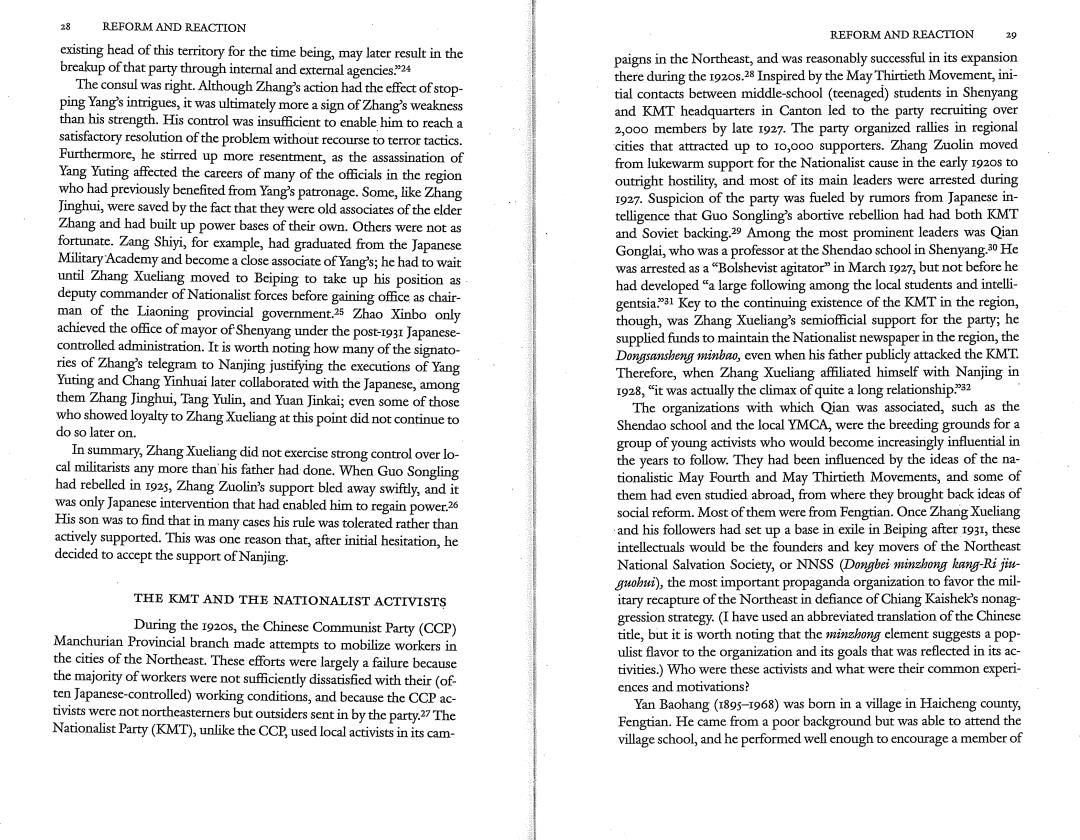
28 REFORM AND REACTION REFORM AND REACTION 29 existing head of this territory for the time being,may later result in the breakup of that party through internal and external agencies.24 paigns in the Northeast,and was reasonably successful in its expansion The consul was right.Although Zhang's action had the effect of stop- there during the r92os.28 Inspired by the May Thirtieth Movement,ini- ping Yang's intrigues,it was ultimately more a sign of Zhang's weakness tial contacts between middle-school(teenaged)students in Shenyang than his strength.His control was insufficient to enable him to reach a and KMT headquarters in Canton led to the party recruiting over satisfactory resolution of the problem without recourse to terror tactics. 2,ooo members by late 1927.The party organized rallies in regional Furthermore,he stirred up more resentment,as the assassination of cities that attracted up to Io,ooo supporters.Zhang Zuolin moved Yang Yuting affected the careers of many of the officials in the region from lukewarm support for the Nationalist cause in the early 192os to who had previously benefited from Yang's patronage.Some,like Zhang outright hostility,and most of its main leaders were arrested during Jinghui,were saved by the fact that they were old associates of the elder 1927.Suspicion of the party was fueled by rumors from Japanese in- Zhang and had built up power bases of their own.Others were not as telligence that Guo Songling's abortive rebellion had had both KMT fortunate.Zang Shiyi,for example,had graduated from the Japanese and Soviet backing.29 Among the most prominent leaders was Qian Military Academy and become a close associate of Yang's;he had to wait Gonglai,who was a professor at the Shendao school in Shenyang.30 He until Zhang Xueliang moved to Bciping to take up his position as was arrested as a "Bolshevist agitator"in March 1927,but not before he deputy commander of Nationalist forces before gaining office as chair- had developed"a large following among the local students and intelli- man of the Liaoning provincial government.25 Zhao Xinbo only gentsia Key to the continuing existence of the KMT in the region, achieved the office of mayor of Shenyang under the post-193I Japanese- though,was Zhang Xueliang's semiofficial support for the party;he controlled administration.It is worth noting how many of the signato- supplied funds to maintain the Nationalist newspaper in the region,the ries of Zhang's telegram to Nanjing justifying the executions of Yang Dongsansheng mibao,even when his father publicly attacked the KMT. Yuting and Chang Yinhuai later collaborated with the Japanese,among Therefore,when Zhang Xueliang affiliated himself with Nanjing in them Zhang Jinghui,Tang Yulin,and Yuan Jinkai;even some of those 1928,"it was actually the climax of quite a long relationship2 who showed loyalty to Zhang Xueliang at this point did not continue to The organizations with which Qian was associated,such as the do so later on. Shendao school and the local YMCA,were the breeding grounds for a In summary,Zhang Xueliang did not exercise strong control over lo- group of young activists who would become increasingly influential in cal militarists any more than his father had done.When Guo Songling the years to follow.They had been influenced by the ideas of the na- had rebelled in 1925,Zhang Zuolin's support bled away swiftly,and it tionalistic May Fourth and May Thirtieth Movements,and some of was only Japanese intervention that had enabled him to regain power.26 them had even studied abroad,from where they brought back ideas of His son was to find that in many cases his rule was tolerated rather than social reform.Most of them were from Fengtian.Once Zhang Xueliang actively supported.This was one reason that,after initial hesitation,he and his followers had set up a base in exile in Beiping after 1931,these decided to accept the support of Nanjing. intellectuals would be the founders and key movers of the Northeast National Salvation Society,or NNSS (Dongbei minzhong kang-Ri jiu guobii),the most important propaganda organization to favor the mil- THE KMT AND THE NATIONALIST ACTIVISTS itary recapture of the Northeast in defiance of Chiang Kaishek's nonag- During the I92os,the Chinese Communist Party(CCP) gression strategy.(I have used an abbreviated translation of the Chinese Manchurian Provincial branch made attempts to mobilize workers in title,but it is worth noting that the mihong element suggests a pop- the cities of the Northeast.These efforts were largely a failure because ulist flavor to the organization and its goals that was reflected in its ac- the majority of workers were not sufficiently dissatisfied with their(of- tivities.)Who were these activists and what were their common experi- ten Japanese-controlled)working conditions,and because the CCP ac- ences and motivations? tivists were not northeasterners but outsiders sent in by the party.27 The Yan Baohang (1895-1968)was born in a village in Haicheng county, Nationalist Party (KMT),unlike the CCB,used local activists in its cam- Fengtian.He came from a poor background but was able to attend the village school,and he performed well enough to encourage a member of
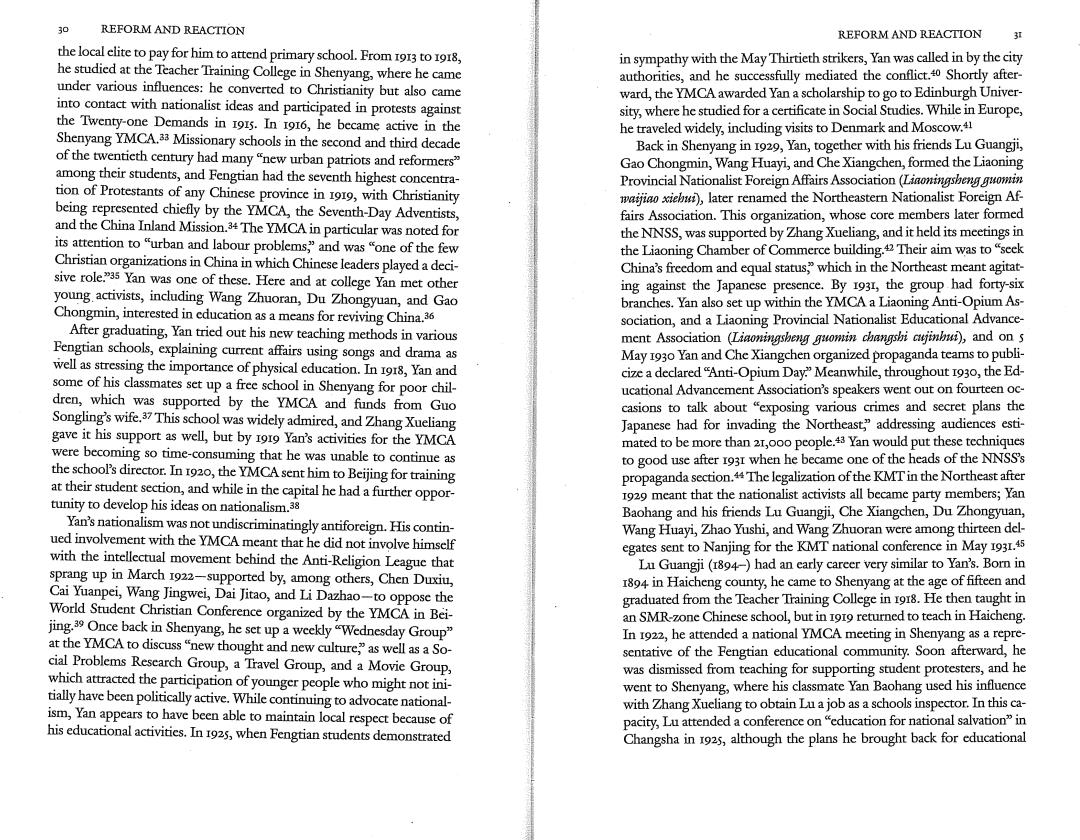
30 REFORM AND REACTION REFORM AND REACTION 3打 the local elite to pay for him to attend primary school.From 1913 to I918, in sympathy with the May Thirtieth strikers,Yan was called in by the city he studied at the Teacher Training College in Shenyang,where he came authorities,and he successfully mediated the conflict.0 Shortly after- under various influences:he converted to Christianity but also came ward,the YMCA awarded Yan a scholarship to go to Edinburgh Univer- into contact with nationalist ideas and participated in protests against sity,where he studied for a certificate in Social Studies.While in Europe, the Twenty-one Demands in IoIs.In 19I6,he became active in the he traveled widely,including visits to Denmark and Moscow.4 Shenyang YMCA.3 Missionary schools in the second and third decade Back in Shenyang in 1929,Yan,together with his friends Lu Guangji, of the twenticth century had many"new urban patriots and reformers" Gao Chongmin,Wang Huayi,and Che Xiangchen,formed the Liaoning among their students,and Fengtian had the seventh highest concentra- Provincial Nationalist Foreign Affairs Association(Linoningsheng guomin tion of Protestants of any Chinese province in I9r9,with Christianity waijiao xiebs),later renamed the Northeastern Nationalist Foreign Af- being represented chiefly by the YMCA,the Seventh-Day Adventists, fairs Association.This organization,whose core members later formed and the China Inland Mission.34 The YMCA in particular was noted for the NNSS,was supported by Zhang Xueliang,and it held its meetings in its attention to“urban and labour problems,”and was“one of the few the Liaoning Chamber of Commerce building.42 Their aim was to "seek Christian organizations in China in which Chinese leaders played a deci- China's freedom and equal status,which in the Northeast meant agitat- sive role.35 Yan was one of these.Here and at college Yan met other young activists,including Wang Zhuoran,Du Zhongyuan,and Gao ing against the Japanese presence.By 1931,the group had forty-six branches.Yan also set up within the YMCA a Liaoning Anti-Opium As- Chongmin,interested in education as a means for reviving China.36 sociation,and a Liaoning Provincial Nationalist Educational Advance- After graduating,Yan tried out his new teaching methods in various ment Association (Liaoningsheng guomin changshi cujinbui),and on s Fengtian schools,explaining current affairs using songs and drama as May 193o Yan and Che Xiangchen organized propaganda teams to publi- well as stressing the importance of physical education.In I98,Yan and cize a declared "Anti-Opium Day."Meanwhile,throughout 1930,the Ed- some of his classmates set up a free school in Shenyang for poor chil- ucational Advancement Association's speakers went out on fourteen oc- dren,which was supported by the YMCA and funds from Guo Songling's wife.37 This school was widely admired,and Zhang Xueliang casions to talk about "exposing various crimes and secret plans the Japanese had for invading the Northeast,addressing audiences esti- gave it his support as well,but by Ioro Yan's activities for the YMCA mated to be more than 21,ooo people.43 Yan would put these techniques were becoming so time-consuming that he was unable to continue as the school's director.In 1920,the YMCA sent him to Beijing for training to good use after I93I when he became one of the heads of the NNSS's at their student section,and while in the capital he had a further oppor- propaganda section.The legalization of the KMTin the Northeast after tunity to develop his ideas on nationalism.38 1929 meant that the nationalist activists all became party members;Yan Baohang and his friends Lu Guangji,Che Xiangchen,Du Zhongyuan, Yan's nationalism was not undiscriminatingly antiforeign.His contin- Wang Huayi,Zhao Yushi,and Wang Zhuoran were among thirteen del- ued involvement with the YMCA meant that he did not involve himself with the intellectual movement behind the Anti-Religion Leaguc that egates sent to Nanjing for the KMT national conference in May I931.45 Lu Guangji (1894-)had an early career very similar to Yan's.Born in sprang up in March 1922-supported by,among others,Chen Duxiu, 1894 in Haicheng county,he came to Shenyang at the age of fifteen and Cai Yuanpei,Wang Jingwei,Dai Jitao,and Li Dazhao-to oppose the World Student Christian Conference organized by the YMCA in Bei- graduated from the Teacher Training College in 1918.He then taught in an SMR-zone Chinese school,but in I9r9 returned to teach in Haicheng. jing.39 Once back in Shenyang,he set up a weekly "Wednesday Group" In 1922,he attended a national YMCA meeting in Shenyang as a repre- at the YMCA to discuss"new thought and new culture,as well as a So- sentative of the Fengtian educational community.Soon afterward,he cial Problems Research Group,a Travel Group,and a Movie Group, which attracted the participation of younger people who might not ini- was dismissed from teaching for supporting student protesters,and he tially have been politically active.While continuing to advocate national- went to Shenyang,where his classmate Yan Baohang used his influence with Zhang Xueliang to obtain Lu a job as a schools inspector.In this ca- ism,Yan appears to have been able to maintain local respect because of pacity,Lu attended a conference on"education for national salvation"in his educational activities.In 1925,when Fengtian students demonstrated Changsha in r925,although the plans he brought back for educational